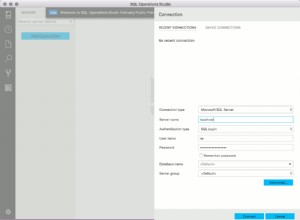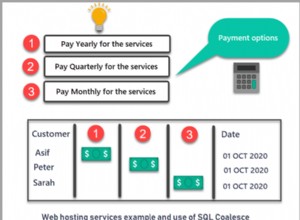Script SQL*Plus per Windows:
set define "&"
set verify off
define mytable = dual
accept param prompt "Enter option 1-9: "
-- Generate a script named prompt_for_tablename.sql which prompts the user for a table name
-- or does nothing, depending on the value of ¶m:
set termout off
column mytable new_value mytable
set head off feedback off
spool prompt_for_tablename.sql
select 'accept mytable char prompt "Enter table name: "' as prompt from dual where ¶m = 1;
spool off
set termout on head on feedback on
@prompt_for_tablename.sql
host del prompt_for_tablename.sql
declare
vari_axu number;
begin
if ¶m = 1 then
dbms_output.put_line ('work here');
select count(*) into vari_axu from &mytable ;
dbms_output.put_line('Count of &mytable: ' || vari_axu);
return;
end if;
dbms_output.put_line ('do not work' );
end;
/
Se l'utente inserisce 1 al primo prompt, lo script generato prompt_for_tablename.sql chiederà un nome per la tabella. Per qualsiasi altro valore, non farà nulla.
Quindi prompt_for_tablename.sql viene eseguito (e immediatamente cancellato, poiché non ne abbiamo più bisogno). Ora &mytable contiene il suo valore predefinito dall'inizio dello script o qualunque cosa l'utente abbia inserito al prompt.
Aggiunto:versione con due variabili
Questo crea una query dinamica come:
select count(*) into vari_axu from &mytable where created > date '&busdate';
A scopo dimostrativo puoi inserire il nome della tabella come user_objects (dove created è una colonna di data).
Ovviamente questo tipo di costruzione diventa complicato e soggetto a errori in quanto l'utente deve specificare una tabella con il nome di colonna previsto, quindi non sono sicuro di consigliare di andare troppo in fondo in questo percorso, ma comunque:
set define "&"
set verify off
define mytable = dual
define busdate = "0001-01-01"
define if_param_is_1 = "--"
accept param prompt "Enter option 1-9: "
-- Generate a script named prompt_for_tablename.sql which prompts the user for a table name
-- or does nothing, depending on the value of ¶m:
set termout off
column mytable new_value mytable
column if_param_is_1 new_value if_param_is_1
set head off feedback off
spool prompt_for_tablename.sql
select prompt, null as if_param_is_1 -- uncomment
from
(
select 'accept mytable char prompt "Enter table name: "'||chr(13)||chr(10) as prompt from dual
union all
select 'accept busdate date format ''YYYY-MM-DD'' prompt "Enter business date (YYYY-MM-DD): "' from dual
)
where ¶m = 1;
spool off
set termout on head on feedback on
@prompt_for_tablename.sql
host del prompt_for_tablename.sql
declare
vari_axu number;
begin
&if_param_is_1 dbms_output.put_line ('work here');
&if_param_is_1 select count(*) into vari_axu from &mytable where created > date '&busdate';
&if_param_is_1 dbms_output.put_line('Count of &mytable created after &busdate: ' || vari_axu);
&if_param_is_1 return;
dbms_output.put_line ('do not work' );
end;
/
Test superando il parametro come 2:
SQL> @demo
Enter option 1-9: 2
do not work
PL/SQL procedure successfully completed.
Test superando il parametro come 1:
SQL> @demo
Enter option 1-9: 1
Enter table name: user_objects
Enter business date (YYYY-MM-DD): 2010-01-01
work here
Count of user_objects created after 2010-01-01: 93772
PL/SQL procedure successfully completed.
(Puoi sopprimere il successfully completed i messaggi con set feedback off .)




